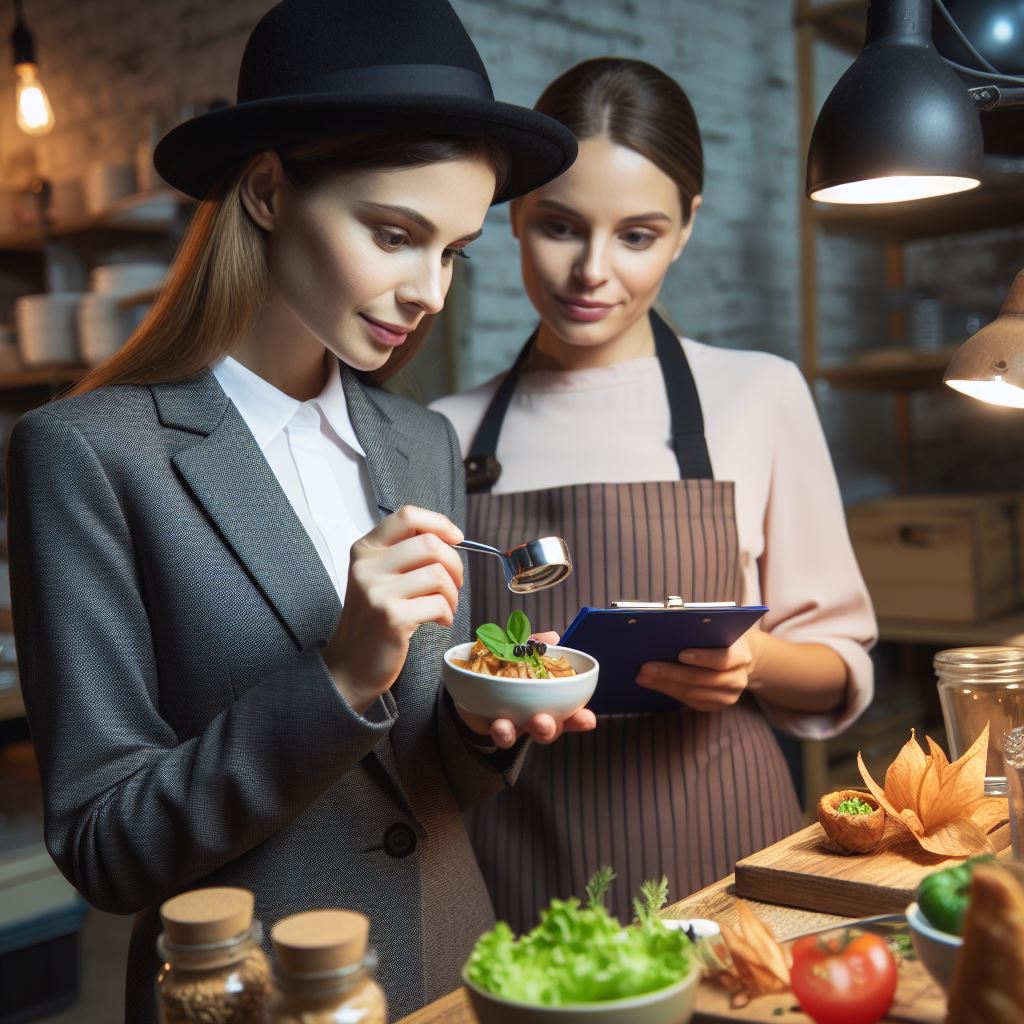Introduction
The event planning industry in Australia stands as a dynamic and flourishing realm, encompassing the meticulous coordination and execution of a myriad of social and corporate gatherings.
At the heart of ensuring the success of these events lies a critical component – catering.
In this comprehensive blog post, we embark on an exploration of the latest catering trends that have become integral to Australian event planning.
Professionals in the field have adopted innovative practices and techniques, transforming the landscape of event catering.
From reimagining food presentation to crafting customized menus, the industry has witnessed a continuous evolution.
This dynamic shift reflects the commitment of catering professionals to not only meet but exceed the expectations of event hosts and attendees.
Join us on this insightful journey as we delve into the intricacies of these catering trends, shedding light on the creative and forward-thinking approaches embraced by industry experts.
The blog aims to provide a comprehensive understanding of the exciting developments shaping the realm of event catering in Australia.
So, fasten your seatbelts and get ready to explore the vibrant and ever-evolving world of catering that plays a pivotal role in elevating the overall experience of events across the diverse landscape of Australia.
Traditional Catering vs. Modern Catering
In the world of event planning in Australia, catering plays a crucial role in creating a remarkable experience for attendees.
Over the years, the catering industry has evolved, and traditional catering practices have given way to modern catering trends.
Let’s explore the differences between the two and the benefits of embracing modern catering in event planning.
A. Explanation of traditional catering practices in Australia
- Set menus: Traditional catering often involved offering guests a pre-determined set menu with limited options, focusing on traditional dishes and flavors.
- Buffet style: Another common practice was the buffet-style serving, where guests were invited to help themselves from a selection of dishes arranged on a long table or counters.
- Sit-down meals: Traditional catering also included sit-down meals where guests were served individually plated meals at their tables.
B. Emerging trends in modern catering
- Customization: Modern catering recognizes the diverse tastes and preferences of guests, offering customizable options to create a personalized experience. This includes dietary restrictions, cultural preferences, and individual choices.
- Interactive food stations: Event planners are now incorporating interactive food stations, such as live cooking stations, made-to-order stations, or food bars, where guests can personalize their food and engage with the chefs.
- Fusion cuisine: Modern catering embraces culinary creativity, combining traditional and international flavors to create unique and exciting fusion dishes.
This appeals to a broader range of tastes and adds an element of surprise to the event. - Locally sourced ingredients: With a growing emphasis on sustainability, modern caterers prioritize using locally sourced, seasonal ingredients.
This not only supports local farmers and reduces carbon footprint but also ensures fresher and higher-quality food for the guests.
C. Benefits of modern catering in event planning
- Enhanced guest experience: Modern catering practices allow event planners to create a more personalized and interactive dining experience, leaving a lasting impression on guests.
- Flexibility: By offering a wide range of customizable options, modern catering caters to different dietary requirements, cultural preferences, and individual tastes, ensuring no guest feels left out.
- Increased variety: Modern catering embraces creativity and experimentation, providing a diverse range of dishes, flavors, and presentations. This keeps the event dynamic and exciting, leaving guests wanting more.
- Trends and innovation: Modern catering keeps up with the latest food trends and culinary innovations, bringing new flavors and experiences to the table. This keeps events fresh and ahead of the curve.
- Sustainability: By prioritizing locally sourced and seasonal ingredients, modern catering contributes to a more sustainable food system, reducing environmental impact and creating a positive image for the event.
Generally, as event planning in Australia continues to evolve, traditional catering practices are being replaced by modern trends.
Modern catering offers enhanced guest experiences, more customization options, a wider variety of dishes, and a sustainable approach.
Embracing these modern catering practices in event planning can elevate the overall event and leave a lasting impression on attendees.
Read: The Rise of Female Chefs in Australia’s Kitchens
Dietary Restrictions and Customization
A. Growing awareness and consideration for dietary restrictions
In recent years, there has been a growing awareness and consideration for dietary restrictions in the Australian event planning industry.
B. Importance of offering customized menu options
Event planners now understand the importance of offering customized menu options to cater to the diverse needs of their guests.
One popular catering trend is the inclusion of vegan and vegetarian dishes on the menu.
Caterers are coming up with creative and delicious plant-based dishes that are enjoyed by both vegans and non-vegans.
Gluten-free options have also become a staple in event planning catering.
Caterers have found innovative ways to replace traditional gluten-containing ingredients with gluten-free alternatives, ensuring that everyone can enjoy the food.
Another dietary restriction that has gained significant attention is lactose intolerance.
Caterers are now offering lactose-free alternatives for dairy-based products, such as lactose-free milk or cheese substitutes.
They are also providing a wider variety of non-dairy desserts, ensuring that guests with lactose intolerance can still indulge in sweet treats.
For those with nut allergies, caterers are steering clear of using nuts and providing nut-free options.
They understand the serious nature of nut allergies and take extra precautions to ensure that their dishes are safe to consume.
Your Personalized Career Strategy
Unlock your potential with tailored career consulting. Get clear, actionable steps designed for your success. Start now!
Get StartedC. Examples of popular catering services that accommodate dietary restrictions
For example, some people may have religious dietary restrictions, such as kosher or halal food.
Caterers are partnering with specialized suppliers to ensure that they can provide meals that meet these specific requirements.
Furthermore, there has been an increased demand for organic and locally sourced food.
Caterers are now incorporating farm-to-table concepts into their menus, offering fresh and sustainable options.
Some catering services have even gone a step further by providing personalized menus based on guests’ preferences and allergies.
They offer guests the opportunity to customize their meals, ensuring that every dish is tailored to their individual needs.
Examples of popular catering services that excel in accommodating dietary restrictions include Greenhouse Canteen and Shelter, a vegan and gluten-free catering service.
This company focuses on serving high-quality, plant-based food while catering to various dietary requirements.
Another example is Nutie Donuts, a catering service that specializes in gluten-free and vegan donuts.
They offer a range of unique flavors and toppings, ensuring that even those with specific dietary needs can enjoy a sweet treat.
In review, dietary restrictions and customization have become integral parts of Australian event planning catering.
Caterers are now more aware and considerate of these restrictions, offering a wide range of customized menu options.
They are partnering with specialized suppliers and incorporating innovative solutions to provide delicious meals that cater to various dietary needs.
Ultimately, the goal is to ensure that every guest, regardless of their dietary restrictions, can enjoy a memorable and satisfying dining experience.
Stand Out with a Resume That Gets Results
Your career is worth more than a generic template. Let us craft a resume and cover letter that showcase your unique strengths and help you secure that dream job.
Get HiredRead: Eco-Friendly Travel: Agents Leading the Way
Sustainable and Ethical Catering
In recent years, there has been a significant increase in the demand for sustainable and ethical food choices in Australian event planning.
Event organizers and attendees are becoming more aware of the impact of catering operations on the environment and society, leading to a shift towards greener and more responsible practices.
Here are some trends and considerations regarding sustainable and ethical catering:
A. Increasing demand for sustainable and ethical food choices
Customers now expect catering companies to offer options that prioritize sustainability and ethics.
This includes reducing food waste, using eco-friendly packaging, and sourcing ingredients responsibly.
B. Incorporating locally sourced and seasonal ingredients in event menus
Many catering companies are now focusing on using locally sourced and seasonal ingredients in their menus.
This not only reduces the carbon footprint associated with transportation but also supports local farmers and businesses.
C. Catering companies that emphasize sustainability and ethics in their practices
Event planners are specifically seeking out catering companies that prioritize sustainability and ethics.
They are looking for companies that promote fair trade, use organic ingredients, and engage in eco-friendly practices.
D. Implementing zero-waste strategies
Caterers are adopting innovative strategies to minimize food waste.
These include using excess food to create new dishes, composting organic waste, and donating leftovers to charitable organizations.
E. Offering vegetarian and vegan options
More and more catering companies are expanding their vegetarian and vegan offerings.
This not only caters to the growing number of individuals following plant-based diets but also reduces the environmental impact of meat production.
F. Reducing single-use plastics
Plastic waste has become a global environmental concern.
Catering companies are taking steps to minimize the use of single-use plastics by providing alternatives such as biodegradable cutlery and reusable containers.
Transform Your LinkedIn for Maximum Impact
Elevate your professional brand with a LinkedIn profile that attracts recruiters, showcases your expertise, and maximizes opportunities. Stand out in your industry with a profile built for success.
Boost ProfileG. Collaborating with local community organizations
Caterers are partnering with local community organizations to support social causes.
This includes hiring from disadvantaged communities, donating a portion of profits to charities, and sponsoring events that promote sustainability.
H. Educating clients and attendees
Catering companies are playing an important role in educating their clients and event attendees about sustainable and ethical practices.
Through menu descriptions, signage, and interactive activities, they raise awareness and encourage responsible choices.
Overall, sustainable and ethical catering is gaining momentum in Australian event planning.
The focus on locally sourced ingredients, zero-waste strategies, and alternative food options reflects the growing consciousness of individuals and organizations towards environmental and social responsibility.
By embracing these trends, event planners can create memorable experiences that not only satisfy attendees’ taste buds but also contribute positively to the planet and society.
Read: Salary Guide: Travel Agents in Australia

Interactive Food Stations
A. The popularity of fusion cuisine in event planning
The rise in popularity of interactive food stations in events has been a game-changer for Australian event planning.
These stations offer a unique dining experience that engages guests and creates lasting memories.
One of the key benefits of interactive food stations is the level of customization they provide for guests.
Rather than being served a pre-set menu, attendees have the opportunity to select their own ingredients, toppings, and flavors.
This not only allows for personalization but also caters to different dietary restrictions and preferences.
Furthermore, interactive food stations encourage socialization among guests.
As they gather around these stations, they have the chance to interact with chefs and other attendees, fostering a sense of community and shared experience.
There are several interactive food stations that have gained traction in Australian events:
- Taco Bars: These interactive stations allow guests to build their own tacos with a variety of fillings, salsas, and toppings. It is a crowd-pleaser that appeals to both meat lovers and vegetarians alike.
- Sushi Rolling Stations: These stations provide guests with the opportunity to roll their own sushi. With an array of fresh ingredients, attendees can create their favorite combinations and enjoy the process of making sushi.
- Pasta Stations: Pasta stations offer guests the chance to choose their preferred pasta, sauce, and toppings. Chefs prepare the dish right in front of them, ensuring a delicious and personalized meal.
- Dessert Bars: These stations are a paradise for those with a sweet tooth. Guests can decorate their own cupcakes, craft personalized sundaes, or indulge in a make-your-own waffle bar.
B. Benefits of interactive food stations for guests
These interactive food stations not only provide entertainment but also enhance the overall guest experience.
They add an element of excitement and engagement that traditional catering setups lack.
Moreover, these stations allow event planners to showcase their creativity and create unique themes.
For example, a Mexican fiesta-themed event can feature a Taco Bar, while an Asian-inspired event can have a Sushi Rolling Station.
Interactive food stations also offer flexibility in terms of space utilization.
They can be easily set up in both indoor and outdoor venues, making them suitable for a wide range of events, including weddings, corporate functions, and social gatherings.
The trend of interactive food stations in Australian event planning is expected to continue growing.
With their ability to provide customization, foster interaction, and create memorable experiences, it’s no wonder they have become a must-have element at various events throughout the country.
When it comes to event planning in Australia, one trend that has gained immense popularity is fusion cuisine.
The blending of different culinary traditions has resulted in exciting and unique flavors that cater to a diverse range of palates.
Event planners are constantly on the lookout for innovative ways to elevate their menus and provide a memorable dining experience for their guests.
The introduction of international flavors and dishes has become a staple in event catering, offering attendees a taste of global cuisine.
C. Famous catering companies specializing in fusion and international cuisine
There are several famous catering companies in Australia that specialize in fusion and international cuisine.
These companies bring together the best of various culinary traditions, creating menus that are a delightful fusion of flavors.
One such renowned catering company is Fusion Fare.
They are known for their expertise in blending Asian and Western cuisines, creating dishes that are both visually appealing and bursting with flavors.
From sushi tacos to Thai-inspired burgers, Fusion Fare never fails to surprise and delight event attendees.
Another popular catering company is Global Gastronomy.
They pride themselves on offering a diverse range of international dishes, ensuring that guests have a chance to indulge in flavors from around the world.
From Mediterranean mezze platters to Indian street food stations, Global Gastronomy leaves no culinary stone unturned.
Event planners are increasingly opting for fusion and international cuisine as it allows them to cater to a wide array of dietary preferences and cultural influences.
By incorporating elements from different culinary traditions, they can create a menu that appeals to both traditional and adventurous eaters.
One of the reasons fusion cuisine has gained so much traction in event planning is its ability to spark curiosity and excitement among guests.
It offers a departure from the typical event fare and introduces them to new and unexpected flavors, making the dining experience truly memorable.
Overall, fusion and international cuisine have become a significant trend in Australian event planning.
The blending of different culinary traditions allows event planners to create menus that cater to diverse palates, while offering guests a chance to explore global flavors.
With famous catering companies specializing in fusion cuisine, attendees can expect a memorable dining experience that leaves them wanting more.
Read: Travel Agents: The Future in Aussie Tourism
Fusion and International Cuisine
A. The popularity of fusion cuisine in event planning
When it comes to event planning in Australia, one trend that has gained immense popularity is fusion cuisine.
The blending of different culinary traditions has resulted in exciting and unique flavors that cater to a diverse range of palates.
B. Introduction of international flavors and dishes in menus
Event planners are constantly on the lookout for innovative ways to elevate their menus and provide a memorable dining experience for their guests.
The introduction of international flavors and dishes has become a staple in event catering, offering attendees a taste of global cuisine.
C. Famous catering companies specializing in fusion and international cuisine
There are several famous catering companies in Australia that specialize in fusion and international cuisine.
These companies bring together the best of various culinary traditions, creating menus that are a delightful fusion of flavors.
One such renowned catering company is Fusion Fare.
They are known for their expertise in blending Asian and Western cuisines, creating dishes that are both visually appealing and bursting with flavors.
From sushi tacos to Thai-inspired burgers, Fusion Fare never fails to surprise and delight event attendees.
Another popular catering company is Global Gastronomy.
They pride themselves on offering a diverse range of international dishes, ensuring that guests have a chance to indulge in flavors from around the world.
From Mediterranean mezze platters to Indian street food stations, Global Gastronomy leaves no culinary stone unturned.
Event planners are increasingly opting for fusion and international cuisine as it allows them to cater to a wide array of dietary preferences and cultural influences.
By incorporating elements from different culinary traditions, they can create a menu that appeals to both traditional and adventurous eaters.
One of the reasons fusion cuisine has gained so much traction in event planning is its ability to spark curiosity and excitement among guests.
It offers a departure from the typical event fare and introduces them to new and unexpected flavors, making the dining experience truly memorable.
Most importantly, fusion and international cuisine have become a significant trend in Australian event planning.
The blending of different culinary traditions allows event planners to create menus that cater to diverse palates, while offering guests a chance to explore global flavors.
With famous catering companies specializing in fusion cuisine, attendees can expect a memorable dining experience that leaves them wanting more.
Explore Further: Understanding Travel Agents’ Service Fees
Conclusion
In wrapping up, we’ve thoroughly examined the dynamic landscape of catering trends within Australian event planning.
It’s abundantly clear that staying attuned to these trends is not just beneficial but imperative for orchestrating successful events.
By remaining updated, event planners can ensure their offerings resonate with contemporary preferences, fostering an atmosphere of relevance and excitement.
Moreover, the encouragement to explore and experiment with innovative catering ideas cannot be overstated.
Embracing novelty and creativity in culinary offerings can distinguish events, leaving a profound impact on attendees.
Therefore, I urge event planners to not only absorb the discussed trends but also to venture into uncharted territories, pushing the boundaries of conventional catering.
In doing so, you not only elevate the experience for attendees but also solidify your reputation as a forward-thinking event planner.
So, let’s continue to embrace innovation and creativity in catering, transforming ordinary events into extraordinary experiences that linger in the memories of all who attend.




